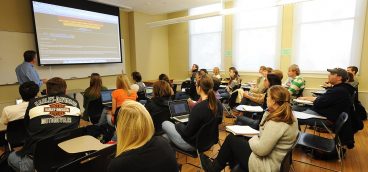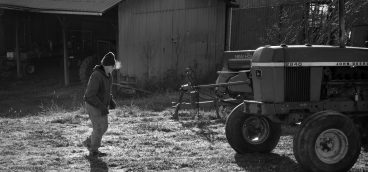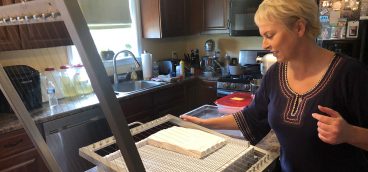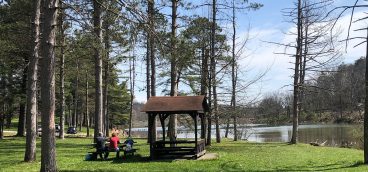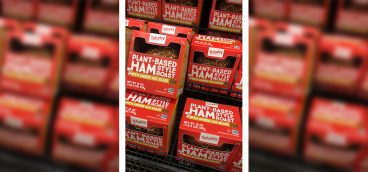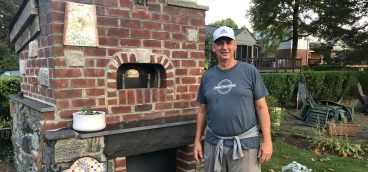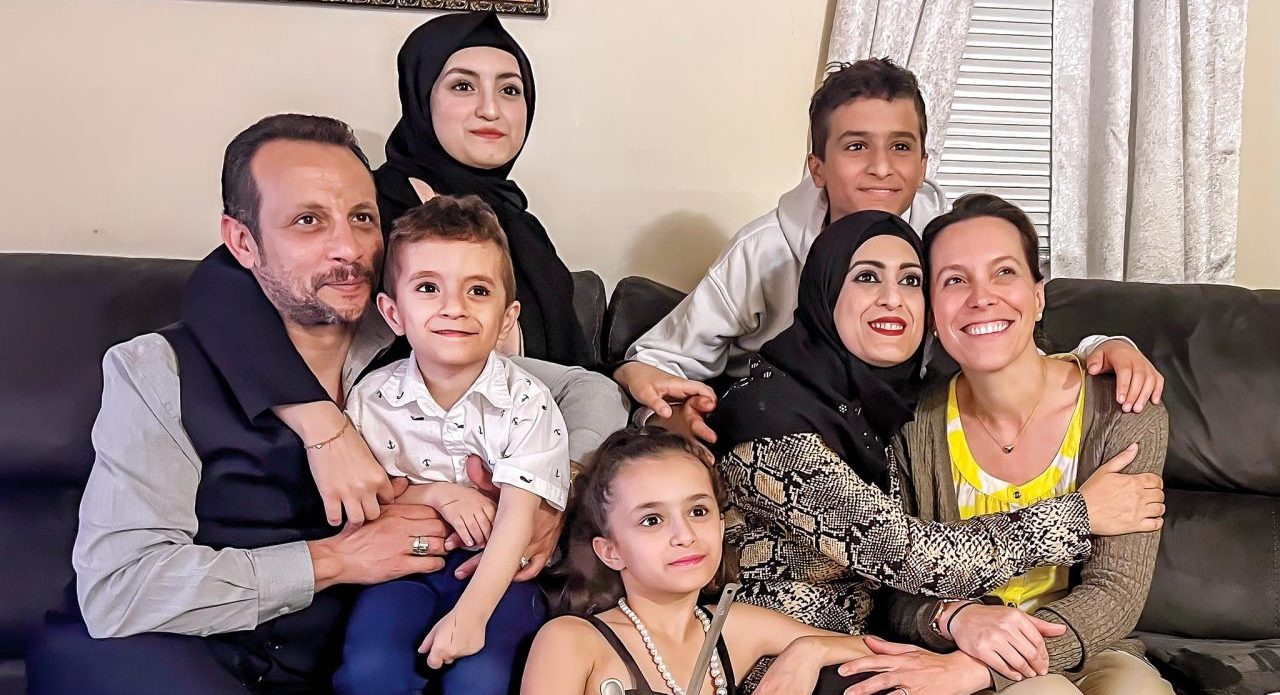
Basel Knaineh and Maisaa Jamal Eddin fled their native Syria after Basel was imprisoned — for no reason and with no timeline, he says — at the start of the Syrian War in 2011.
He spent a month in jail, frantic and bewildered, before being released as suddenly as he was detained. Desperate, he and his family of four left for Jordan, where his mother lives, and applied to the International Organization for Migration for protection. There they waited five long and uncertain years, the required period for political asylum, before being approved for entry into the U.S. It’s a status fewer than 1 percent of applicants attain.
Ask Basel today how hard the transition was and his face clouds over, his expression conveying the pain. Arriving jobless in Pittsburgh with two children, ages 10 and 3, they didn’t know a soul and they didn’t know the language.
“It was very hard,” he says quietly. “From the bottom of my heart, the organizations that were supposed to help failed us.” Beside him, his wife nods sadly.
On a warm June night, the couple gather with their four children for dinner at their comfortably furnished townhouse in Terrace Village in the Hill District. Bird cages hang from the ceiling with colorful parakeets that chirp and bustle. The table is decked with a feast prepared by Maisaa, of sauteed fish, a steaming dish of rice and marinated chicken, and a large salad tossed with a mint and lemon dressing. Guests include this writer, an interpreter, and the founder and head of the nonprofit Hello Neighbor, Sloane Davidson.
The husband and wife talk back and forth in Arabic, debating whether to name names on who failed to help them, as the bird chatter swells.
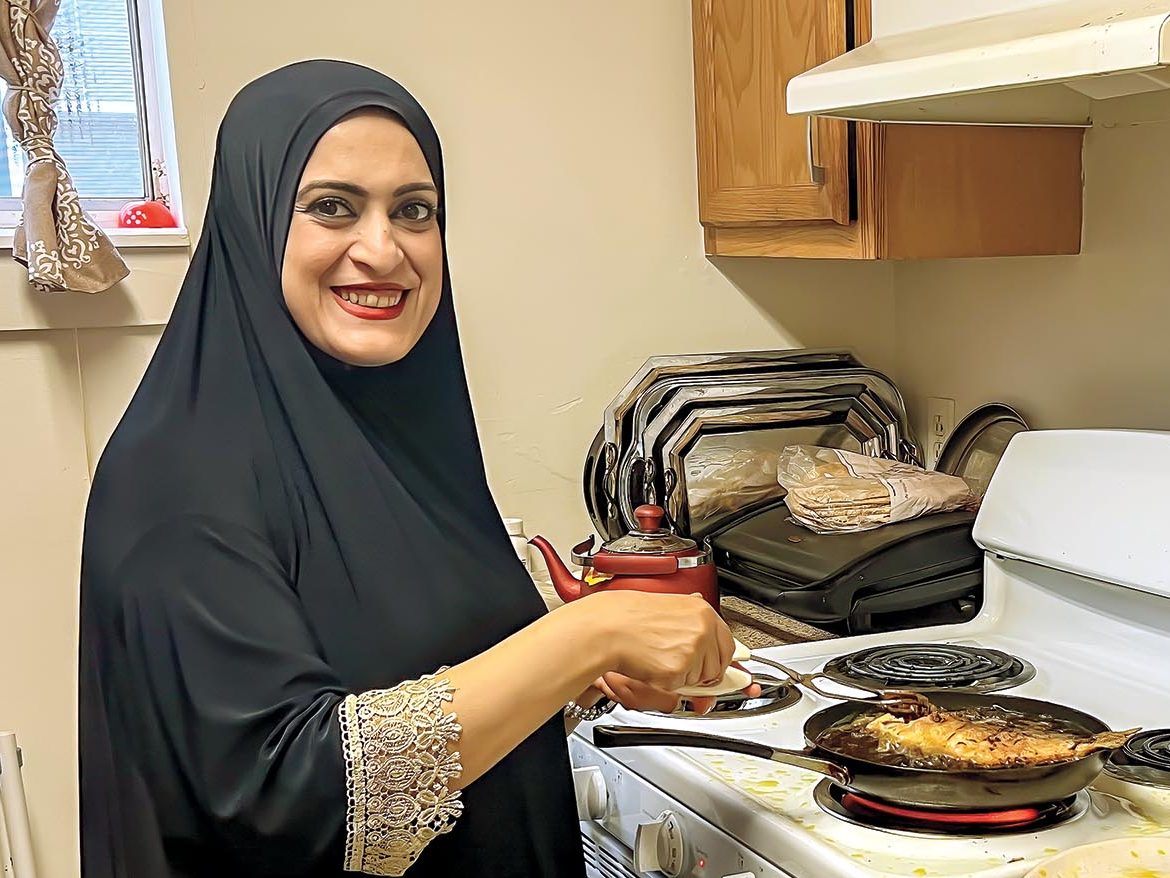
Maisaa in her kitchen at home, whipping up a feast for her family and guests. She hopes to open a cooking business one day.
Finally, Basel says: “It wasn’t until we were introduced to Hello Neighbor five years ago that we were truly helped.” Maisaa, wearing a black veil and vivid red lipstick, nods. The birds quiet, as if in agreement.
Hello Neighbor started in 2017 to improve the lives of recent refugees by matching them with dedicated neighbors to help navigate the very trying transition. It was initially meant to fill in the gaps that other agencies didn’t have the time or manpower to address.
Their daughter Maha, for example, was “very, very scared,” she says, to start a new school where she didn’t know the language, the customs, or the lay of the land. Worse, she lacked a birth certificate, so her age was recorded wrong when the family entered the U.S. The bright 10-year-old was assigned to second grade.
It took their Hello Neighbor mentors, Clare Wardwell and Ken Hornfeck, to correct the problem. As a result, Maha tested out of sixth grade and took seventh and eighth grade at the same time. Today, at 17, the poised and smart junior in the Science and Technology Academy says her ambition is to go into forensic medicine.
Basel listens to his daughter, who is fluent in the language he has yet to master. “We are devoted to the future of our children,” he says. “The beauty of America is, even the child has rights — and that’s my treasure. I see their beautiful future.”
“My life is over,” he adds. A stylish dresser, wearing a button-down shirt, black vest and gold watch, Basel worked in a clothing store in Syria. He is now an Uber driver, he says with a slight shrug. The job supports the family. He held other “gateway jobs” over the years, working in a restaurant, a pizza shop and a hotel, before he found jobs with Amazon and Uber, which he worked in tandem for a while.
“My life isn’t over!” exclaims Maisaa with a grin. She manned her first booth selling her Middle Eastern food at the Global Market in Market Square the other night. Her hope is to one day open a cooking business.
She credits the baking program at Hello Neighbor for the idea of putting her skills to money-making use. She turns to Sloane: Does she know where she could find a tent for her booth? “I have an idea,” says Sloane, “and we can talk about it tomorrow.”
The conversation doesn’t get far in any direction without them referencing Hello Neighbor and their mentors and Sloane — how much the organization has done for them, how much they love her, when would her son return with her to play with 4-year-old Mohammed? “Bring your family,” urges Basel. “Come to dinner!”
Sloane, who conveys a quiet sense of competence, patience and charm, joins in the conversation easily as she teases apart a whole fish to share. When Basel chides Maha for not doing better on her report card, Sloane defends her, saying, “You had one B!”
“One B!” repeats Maha solemnly. The rest A’s. “He is so hard on me.”
“He wants you to succeed,” says Sloane.
That is clear from Basel’s expression as he looks with pride at his daughter, who sits at the head of the table. Much can be conveyed without language, such as how the two sons and two daughters, ages 4 to 17, snuggle up to or wrap their arms around their parents throughout the evening. They are an affectionate, well-behaved crew who seem happy to be included. It is clear Basel’s life is far from over.
“When we came here, we had nobody,” he says. “Now, the new wave of Syrians don’t have to suffer as much because there are other Syrians here. They’re already connecting to Arabs who can help them.”
For most immigrants, the language barrier and lack of community are the toughest challenges, along with money and navigating services. Everything — from getting into school to opening a bank account to landing job interviews — is complicated. Since they don’t own a car, they must learn to ride a bus, and how do you do that if you don’t know the language?
Transition services are provided by case managers at one of four refugee resettlement groups in Pittsburgh — including Jewish Family and Community Services, AJAPO (Acculturation for Justice, Access and Peace Outreach) and Bethany Christian Services. The case managers have a tight deadline to complete many vital services, wrapping up the initial resettlement in 90 days. While they do a great job, Sloane says, their list is long and their caseload is heavy.
Then there’s Hello Neighbor, which became an official refugee resettlement group in 2022, while still delivering its mentoring and other services. When Sloane started Hello Neighbor, she had established a relationship with a Syrian family, similar to a Big Brothers Big Sisters mentorship. She went to a Ramadan service at their house; they attended their first Christmas party together. Along the way, Sloane noticed the questions they asked usually focused on figuring things out. What they continued to need in their transition was a friend in the know.
For example, the husband once pulled out a crumpled paper from his shirt pocket and said he was very concerned about this document from the hospital, where his wife had recently been treated. It was clear he had been carrying it around for a while, says Sloane. In a glance, she saw it was just a survey. Rip it up, she conveyed through a hand gesture, and throw it away. He did so with great relief.
Or, when the older daughter, a high school student, wanted a laptop. The family didn’t own a computer so they couldn’t shop online, and they had no idea where to buy one. “You’re talking about literacy in some cases, and you’re also talking about digital literacy,” says Sloane who introduced them to big box stores where the prices were lower.
For Basel and Maisaa, connecting with Hello Neighbor made all the difference. “They don’t make you feel like a refugee or a stranger. They make you feel like they’re part of your family,” says Basel. “She brought her family to my house at the time. She changed my view of America.”
Now the family — a multi-generational effort, which Hello Neighbor encourages — are paying it forward by mentoring a recently arrived Syrian family. They were with the family from day one, says Maisaa, telling them the best places to shop, taking them to stores and parks, even teaching them how to drive.
“We hang out with them now,” says Maha happily. “She pauses then turns to her parents to say, “This is one of your successes.”
She is another, of course. Maha at one point reminds Sloan that she is still interested in the Learn and Earn program at Hello Neighbor. The nonprofit, which has worked with hundreds of immigrants from 26 countries, offers a range of programs and often hires from among its community. Sloane takes note (and later approves Maha for the program) while Basel nods in approval.“I want her to be smart and to be an activist always,” he says of his daughter. “Like Sloane.”





